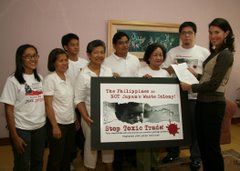The editorial piece below came out in today's edition of the Philippine Daily Inquirer, the country's leading broadsheet. It also published Atty. Golda Benjamin's response to Solita Monsod's article, The Other Side of JPEPA, in today's Letter To The Editor section.
EDITORIAL
Sun sets on JPEPA
Inquirer
Last updated 10:37pm (Mla time) 10/10/2007
TO THE UNTRAINED EYE or the unsuspecting mind, the scrupulously measured language of the Japan-Philippine Economic Partnership Agreement seems neutral enough. The first provision of Article 96, for instance, seems fair on its face: "Each Party shall accord to investors of the other Party that have suffered loss or damage relating to their investments ... due to armed conflict or state of emergency such as revolution, insurrection, civil disturbance or any other similar event ... treatment ... that is no less favorable than the most favorable treatment which it accords to any investors."
It takes a lawyer like former University of the Philippines College of Law dean Merlin Magallona to see through the balanced blandness. This article and another one related to it, Article 98, mean the Philippines agrees to serve as a guarantor of Japanese investments against the risk of civil disturbances and the like. "This would make the Philippines liable for acts of private individuals," Magallona told the Senate foreign relations committee the other day. "This is a remarkable abdication of our sovereign prerogative. We should be responsible only by reasons of our own sovereign acts, not those by private persons."
Come to think of it, what is the probability that Philippine investments in Tokyo will be lost because of, say, an insurrection in Japan?
Magallona and another, even more eminent lawyer, former Supreme Court Associate Justice Florentino Feliciano, presented separate legal studies they had prepared on the controversial JPEPA before the Senate committee chaired by Sen. Miriam Defensor-Santiago. (Feliciano's paper was read by another lawyer.) Feliciano, perhaps the country's foremost expert on international law, said the JPEPA was marked by "serious constitutional problems." He pointed to several instances, including Annex 7 of the agreement, which lists what is called the schedule of reservations. That listing of exceptions is fatally incomplete, Feliciano said.
"This omission in the Philippine Schedule to Part 1 of Annex 7 means that, should JPEPA come into legal effect, Japanese investors would be entitled to own more than 40 percent of a public utility enterprise in the Philippines under the JPEPA. This result would be in direct contravention
of our Constitution."
When that happens, the Philippines can refuse to allow it, precisely on constitutional grounds. When it does so, however, "such denial would ... be a breach of our treaty obligations ... and generate ... probable liability for damages before an international judicial or arbitral forum."
Those who defend the agreement by reassuring the public that unconstitutional arrangements would be disallowed anyway fail to mention that, by allowing the possibility of such arrangements in the first place, the Philippine government has already acted against its own best interests.
But if the omissions in the Philippine schedule of reservations in Annex 7 are an instance of a contracting party tying one hand behind its back, the stipulations in Article 94 (again, innocuous to the non-legal eye) give us an example of a contracting party tying itself to a corner, and on its own
initiative. These provisions prevent Congress from passing laws in the future that may run counter to the JPEPA, Feliciano said.
Santiago is a key ally of President Gloria Macapagal-Arroyo and a supporter of key administration measures. But she is also a lawyer, and her respect for Feliciano is boundless. ("In my personal view, when Justice Feliciano says something, that is no longer debatable," she said. Feliciano's opinion "is simply [on] the level of the supernatural--when he says something, there is almost nothing that you can say against it.")
The impact the position papers of Feliciano and Magallona had on the committee members seems to have sealed the fate of the agreement.
Much of the controversy over the JPEPA involves the possibility of toxic waste dumping, the tighter rather than looser access to the Japanese market for Filipino nurses, the government's lack of transparency. It was necessary to debate these issues, but the other day Santiago drew the JPEPA bottom line with great precision: "That is the most fundamental priority of all these hearings: Is it constitutional or not?"
It isn't.
Thursday, October 11, 2007
Subscribe to:
Post Comments (Atom)






No comments:
Post a Comment